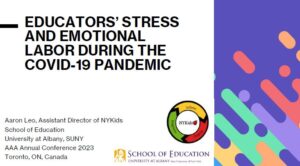Highlights from NYKids’ Conference Presentations, Part II: Educators’ Stress and Emotional Labor (and Why Promoting Collegiality is Key)
By Aaron Leo and Kristen C. Wilcox
While NYKids Director Kristen C. Wilcox attended the UCEA convention in Minneapolis, Minnesota, co-facilitating critical conversations on collaborative research, Aaron Leo, Assistant Director of Research for NYKids, was in Toronto, Canada for the American Anthropological Association’s annual conference. The conference was held from November 15 to November 19 and centered around the theme of “transitions.”
During a panel held on November 19, Dr. Leo joined a panel of other researchers to discuss the topic of “Teachers’ and Students’ Agency During Critical Transitions” and present findings from NYKids’ recent study of educators’ Adaptations and Innovations during the Pandemic. The paper, co-written with Wilcox, was entitled “Educators’ emotional labor during the COVID-19 pandemic” and focused on educators’ emotional responses during the pandemic.

Other panelists discussed research on important educational issues ranging from project-based assessments, teaching English learners during the pandemic, and teacher activism.
What the research says…
- Emotional ecologies and the emotional labor of teaching
As scholar Andy Hargreaves notes, educating youth is not only about teaching content but is also a deeply “emotional practice.” In this sense, being a “good teacher” often involves displaying positive emotions in the classroom and suppressing negative ones. Emotional labor is a term used to capture the work of this emotional management.
Although all educators must manage their emotions in different ways, teachers’ practice is always set within a larger context – or what Zembylas calls an “emotional ecology.” On this note, as previous NYKids research has shown, changes in education policy may impact the ecology of educators’ work environments, which can in turn impact their emotional resilience.
Recent scholarship (including from NYKids) has documented educators’ rising stress levels and negative emotional experiences. A range of factors have been implicated including:
- educators feeling concerned for students but also feeling more disconnected from them;
- a decline in teacher self-efficacy during periods of remote teaching; and
- rising tensions between community members and educators.
Themes from NYKids studies…
- Educators felt anxious, “spent”, and stressed
Educators reported a rise in negative emotions (e.g., anxiety and exhaustion) and stress during the pandemic, as well as the need to manage and mask these emotions especially in front of students. As a principal explained:
It’s one of those things that you know, is very hard on the teachers… I didn’t want [students] to see that I was spent. No, it means you’re always trying to just have that game face on. Try to be as positive as possible. Because…like, you’ll get through this. We got it. It’ll be all right.
- Educators felt worried, guilty, and frustrated
Educators worried about their students during periods of school shutdowns and felt frustrated over their perceived inability to directly support them. Educators also felt guilty about the quality of teaching during periods of remote schooling. As one teacher said:
And [we] worry, and then where are they? And knowing the environments that some kids go [home] to, and school was their safe place. And when they’re not connecting with you online, you know, where are they? Are they okay? Are they eating? Are they safe?

- Buffering factors: Colleagues and emotional labor
What helps educators manage their emotions during challenging times?
Hands down – the major finding from NYKids studies – regarding this question was: colleagues.
For instance, colleagues provided each other with safe spaces to let off steam and make sense of challenges. As one teacher said:
Like you can lose it, and you could lose it with your colleagues, and it was okay. You could be angry, frustrated, mad at the world. And it was okay to be angry, frustrated, mad, or mad at the world. Because if we weren’t allowed to be that, then we couldn’t have come back and restarted every day.
- Not all stress is bad…
Educators also expressed some positive emotions they experienced during the pandemic such as pride about overcoming challenges and supporting their fellow colleagues. Others expressed heightened levels of empathy for students and their families due to pandemic. As one teacher put it:
I think one positive also was when we were Zooming, I think it made staff more aware where our families were coming from. Because we really got an open view in the home life, and it’s kind of an eye-opening experience.
Educator well-being now and in the future
Overall, NYKids study findings suggest that educators experienced a range of negative emotions as well as stress during the pandemic. They also struggled to manage these emotions and relied on their colleagues for support.
Despite these challenges, educators also described some positive emotions such as pride for overcoming pandemic-related challenges as well as increased empathy for students and their families.
As stress and negative emotions are linked with educator burnout and turnover, it is crucial for leaders and policymakers to find ways to support educators now and in the future.
Research suggests that educators benefit from a range of practices and resources to mitigate stressors such as:
- Empathetic leadership characterized by care and recognition
- Purposeful attention to reinforcing a collaborative and inclusive working climate
To read more on this topic see the full presentation here and more related research is on our website. We welcome your questions or feedback at nykids@albany.edu. Please follow us on Facebook, X, Instagram, and LinkedIn.
Tag:conference, emotions, research
